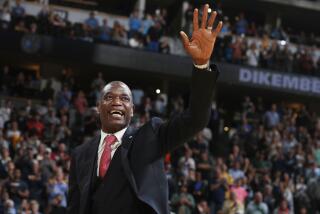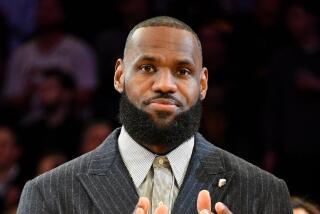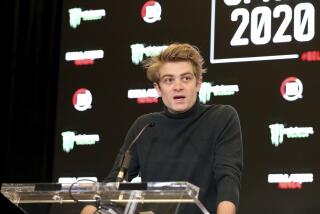COLUMN ONE : Marketing the Athlete as Package : No. 4 NBA draft pick Dikembe Mutombo is being ‘positioned’ as a superstar advertising vehicle. But if he can’t play pro basketball, the wheels will fall off.
- Share via
Dikembe Mutombo is the kind of athlete who’s determined to make it to the top with nothing more than his basketball talent and his native wit.
And his business agent, his marketing agent, his college coach, his record producer, his video crew, his photographer, his publicist, his makeup person . . .
Promoters of Mutombo, a 7-foot-2-inch native of Zaire in central Africa and rookie center for the Denver Nuggets, can hardly wait for him to be a superstar.
And why should they?
In the olden days of sports marketing, you practically had to be in the Hall of Fame before a cigarette company would put you on its billboards.
But today, one trading card publisher specializes in draft picks --young prospects who have never played a minute of professional ball. Kids buy the cards like lottery tickets, hoping a future Michael Jordan is lurking.
That, in a sense, is what the people at DIC Sports Marketing are trying to do with Mutombo. He may not be the next Michael Jordan. But if he is, they’re not going to leave any money on the table.
Recent newcomers to the sports world--not just entertainment firms such as DIC, but also Hollywood lawyers and accountants--think sports has been too passive in exploiting its marketing opportunities.
There are valuable lessons to learn from the movie business and Madison Avenue, they say. To be sure, the outcome of a game can’t be known in advance, but that doesn’t mean a script can’t be written for what happens off court.
“The idea is to develop a positioning and a marketing plan--not to just sit back and be order-takers,” said Andy Heyward, president and majority owner of DIC Enterprises, the Burbank cartoon production house that spawned DIC Sports Marketing last summer.
In the 1980s, DIC (pronounced deek ) helped turn cartoon production into a low-margin, quick-turnaround business, like the garment industry.
You start with a property, preferably a well-known figure who appeals to kids. Pro wrestler Hulk Hogan, say. You create a story line around your star. You ship a batch of scripts to the manufacturer in Taiwan, where an assembly line of animators can pump out cartoons much cheaper than at home. Then you use the shows to cross-sell the ancillary merchandise, such as cereal and toys.
It’s a winning formula, and it vaulted DIC in just 10 years from nowhere to the No. 1 spot in the Saturday morning cartoon lineup--the only studio with at least one show on every network (including Fox) in kiddie prime time.
From his work on cartoons--including the new “Pro Stars” show featuring Jordan, Los Angeles Kings hockey star Wayne Gretzky and dual-sport celebrity Bo Jackson--Heyward came to realize that in a marketing sense, an athlete and a cartoon hero aren’t all that different.
“You position him as a character in the marketplace,” he said.
Mutombo’s position--at least the working version, developed in marathon brainstorming sessions among DIC creative people--is as “Dikembe Mutombo, The Natural Superstar.” As soon as they’re sure of the approach, Heyward said, they’ll trademark it.
The Stratosphere
DIC’s dream would be to propel Mutombo--the No. 4 pick in this year’s National Basketball Assn. draft, but by no means a guaranteed star--into the marketing stratosphere occupied by Jordan, the Chicago Bulls’ all-world guard.
Though it’s hard to quibble with the way Jordan has been handled--Forbes magazine estimated his off-court earnings at $13.2 million, four times his basketball salary--Heyward quibbled.
In his office recently, Heyward pointed out a Michael Jordan watch with a cartoon caricature that only vaguely resembled the likeness on Michael Jordan T-shirts or--more to the point--the Michael Jordan character on DIC’s “Pro Stars” series.
Such inconsistency bespeaks a lack of control over Jordan’s image, the natty, 42-year-old Heyward said. It won’t happen with Mutombo, he vowed.
“A Dikembe Mutombo toothbrush is not going to look any different than a Dikembe Mutombo lunch box,” Heyward declared.
To enforce consistency, DIC uses a “stylebook.” When salespeople go out to sell Mutombo, they will carry a glossy, ring-bound book. It will have pictures of Mutombo in street clothes, in game uniform, in a wide array of poses.
And it will have a character sketch with background details, simplified and condensed, to guide advertisers, so they don’t fuzz up the image with incongruous tie-ins.
Here are a few of Mutombo’s selling points: Comes from middle-class family in Kinshasa, Zaire. Speaks French, English, Spanish, Portuguese and five African dialects. Has incredibly low body-fat ratio of 1.8%. (Forget junk-food endorsements!) At Georgetown University, was great shot-blocker and rebounder, so-so scorer. Was one of the few first-round picks in NBA draft who held a degree (linguistics and diplomacy) on draft day. Doesn’t chase women or use drugs. Keeps up with world events. Reads.
That’s the raw material. The key is how you work it up.
Working the Angles
The languages and the international flavor make Mutombo perfect for American Telephone & Telegraph, Heyward thinks. The lean physique and the clean-living angle would work for the National Dairy Council or an orange juice maker, maybe a health food company. (Heyward speaks quickly and carves the air with his hands when he’s spinning out these ideas.) Fast foods are a possibility, but the “natural” aspect would have to be played up, perhaps with salads.
As an advertising vehicle, Mutombo clearly has potential. But everybody knows the wheels fall off if he can’t play NBA basketball.
In his first few pro games since the start of the exhibition season last week, Mutombo has been a solid, if not dominating, player. Said Phoenix Suns coach Cotton Fitzsimmons: “Mutombo is a little crude, but he’s a strong young man, and I’d like him on my team.”
Against the lowly Los Angeles Clippers this week, he guided the Nuggets to their first exhibition win, leading all scorers with 24 points and 14 rebounds.
So Mutombo is off to a respectable start. But is it premature to launch a full-blown marketing campaign before he fully proves himself?
“Why put ourselves one year behind schedule?” asks DIC executive John (Sonny) Vaccaro. “I think you can spot the talent and create the attention.”
He would know.
Saw the Big Deal
Sonny Vaccaro, 52, was present at the creation, when Nike signed Michael Jordan to his first endorsement contract in 1984. That deal, and the Air Jordan line of shoes that followed, helped turn Nike into a retailing and pop-culture phenomenon.
And it helped turn Vaccaro--a former high school coach from Pittsburgh--into an unlikely basketball kingmaker. Where Heyward speaks fluent French and wears continental suits, Vaccaro looks as if he was born in a golf shirt.
At his peak as Nike’s top basketball consultant, Vaccaro wielded a $3-million budget for endorsement deals with premier college coaches such as Georgetown’s John Thompson, the University of Nevada at Las Vegas’ Jerry Tarkanian and North Carolina State’s former coach Jim Valvano. Thompson earns a reported $200,000 a year for outfitting his team in Nike shoes and equipment.
After Nike signed Jordan, Vaccaro’s influence only multiplied. So did complaints from sports agents and non-Nike coaches that Sonny had too much power, that Sonny funneled the best high school talent to colleges whose coaches were under contract to Nike. Vaccaro has been slapping back at those detractors for years, denying any wrongdoing, but the criticism still makes him testy.
He was still at Nike when he started working for DIC as a consultant. However, when agents complained that he was competing against them directly in the new role, Vaccaro and Nike parted ways this August.
Once installed as co-chairman and an equity partner of DIC Sports Marketing, Vaccaro immediately signed Mutombo and two other first-round draft choices: Billy Owens of Syracuse University, chosen No. 2 overall by the Sacramento Kings; and Stacey Augmon of UNLV, picked No. 8 by the Atlanta Hawks.
Vaccaro’s fee is 15% of any endorsement contracts--steep, compared to what some sports agents charge. But his is a boutique, prestige operation, he says. In five years, he expects to have no more than 15 athletes--all blue chippers--under the DIC emblem. DIC will handle only marketing and endorsement deals, leaving traditional sports agents to conduct salary negotiations with the teams.
If it was risky for Vaccaro to quit Nike, the new venture also poses risks for parent DIC Enterprises.
The sports unit is an attempt to create a new revenue stream for a company straining under the nearly $100 million of debt it has built up since Heyward acquired DIC in 1986. Interest payments of $14 million to $15 million a year have left the company “capital starved,” said Claude Ravier, DIC executive vice president and a small shareholder.
Cartoon production costs are rising, and competition from the major studios--including Disney and Warner Bros.--is increasing. DIC is seeking an investor to buy Prudential Insurance’s share of its debt. Prudential holds the bulk of the debt from Heyward’s purchase.
“Prudential has been basically a bank,” Heyward said. He’d prefer a partner, who would share in profits but wouldn’t charge interest.
Last month, PolyGram Records was reported to have agreed to buy out Prudential. Heyward denied it; in any event, the deal never materialized. DIC is still looking for its sugar daddy.
Meanwhile, the sports unit is on its maiden cruise with its first client.
Marketing Practice
It’s a Tuesday afternoon at a recording studio in Studio City, during a recent three-day visit by Mutombo to Los Angeles to work on his marketing game.
Mutombo had spent the morning in a Hollywood photography studio, posing for pictures for the stylebook that will be shown to potential endorsement clients.
He changed clothes several times during the session, alternating between a double-breasted business suit and a variety of basketball togs with the logos of different shoe companies.
For “action” shots with a basketball, he was sprayed with glycerin to simulate sweat.
Now, in the same studio where DIC records its cartoon soundtracks, Mutombo is struggling with the lyrics to “Dikembe Block,” a new song penned by DIC writers to the tune of the old calypso hit, “Limbo Rock.”
DIC thinks a “signature song” will help focus the excitement that Denver Nuggets fans will feel every time Mutombo strides onto the home court. When he bats away an opponent’s shot, it won’t be just a block. It will be a Dikembe Block.
Of course, Mutombo’s from Central Africa, not the West Indies, but calypso is close enough. It’s foreign-sounding, and it shows black influence. It fits with the package.
For Mutombo, who learned his English in six-hour-a-day classes as a Georgetown freshman just four years ago, the calypso speech patterns are an obstacle course:
Hey mon, have you heard da word?
No more flyin’ like a Bird.
No more Mail delivery.
He don’t come into da key.
The “delivery” line is a problem. To fit the ticktock meter, he should sing, “No more MAIL-dee-LIV-er-EE,” but his native French keeps intruding: “No more MAIL . . . DEH-li-VREE.”
The sound engineers are patient, and Mutombo is persistent.
Finally, after three hours, they have a passable voice track to lay over the instrumentals. Even if he doesn’t always hit the beat, Mutombo’s rich bass voice has an infectiously humorous quality.
This could be a minor hit in Denver, the DIC team hopes.
In person, Mutombo is an appealing mixture of savvy and naivete. DIC executives took him to dinner at Spago a few weeks ago and introduced him to celebrity chef Wolfgang Puck, whose apron was covered with flour from his famous designer pizza. After Puck left, Mutombo asked why the owner of a fancy restaurant should need to work in the kitchen. It cracked everybody up, Vaccaro said.
On the other hand, Mutombo is no fool. He seems more worldly than most 25-year-olds, particularly pro athletes, who often mature slowly or not at all in the cocoon of wealth and acclaim.
Asked how he can be sure that his new-found advisers at DIC are trustworthy, he said: “When I’m working with DIC, I’ve got my other people checking on DIC, and DIC checks on them. You don’t just give somebody a job and say, ‘Do this for me,’ while you’re sitting at home.”
Among his “other people” are lawyer David Falk, who conducted the negotiations with the Nuggets that resulted in Mutombo signing a five-year, $13.75-million contract last Tuesday.
Falk, whose ProServ agency also represents Michael Jordan, negotiated with Heyward and other DIC officials in putting together the “Pro Stars” cartoon series.
“While we would very much like to have represented him in marketing,” Falk says of Mutombo, “I foresee no problems working together with DIC.”
Also in the picture is Georgetown coach Thompson, who has acted as a proxy father to Mutombo, traveling with him and grilling his would-be advisers on their plans before they were hired.
“He’s like my daddy,” Mutombo said.
Sonny Vaccaro loves Mutombo, too. In his heart, though, he knows this one isn’t the new Michael Jordan.
Vaccaro, who recently produced a TV tribute to Jordan to raise funds for charity, saw close up that the Chicago star’s talents extended even to variety-show patter. It’s very rare for an athlete to combine so many abilities in one package.
It may be a one-in-a-million shot, but Vaccaro keeps looking. If it isn’t Mutombo who hits the home run, another DIC client might.
Says Vaccaro: “It only takes one.”
More to Read
Go beyond the scoreboard
Get the latest on L.A.'s teams in the daily Sports Report newsletter.
You may occasionally receive promotional content from the Los Angeles Times.










